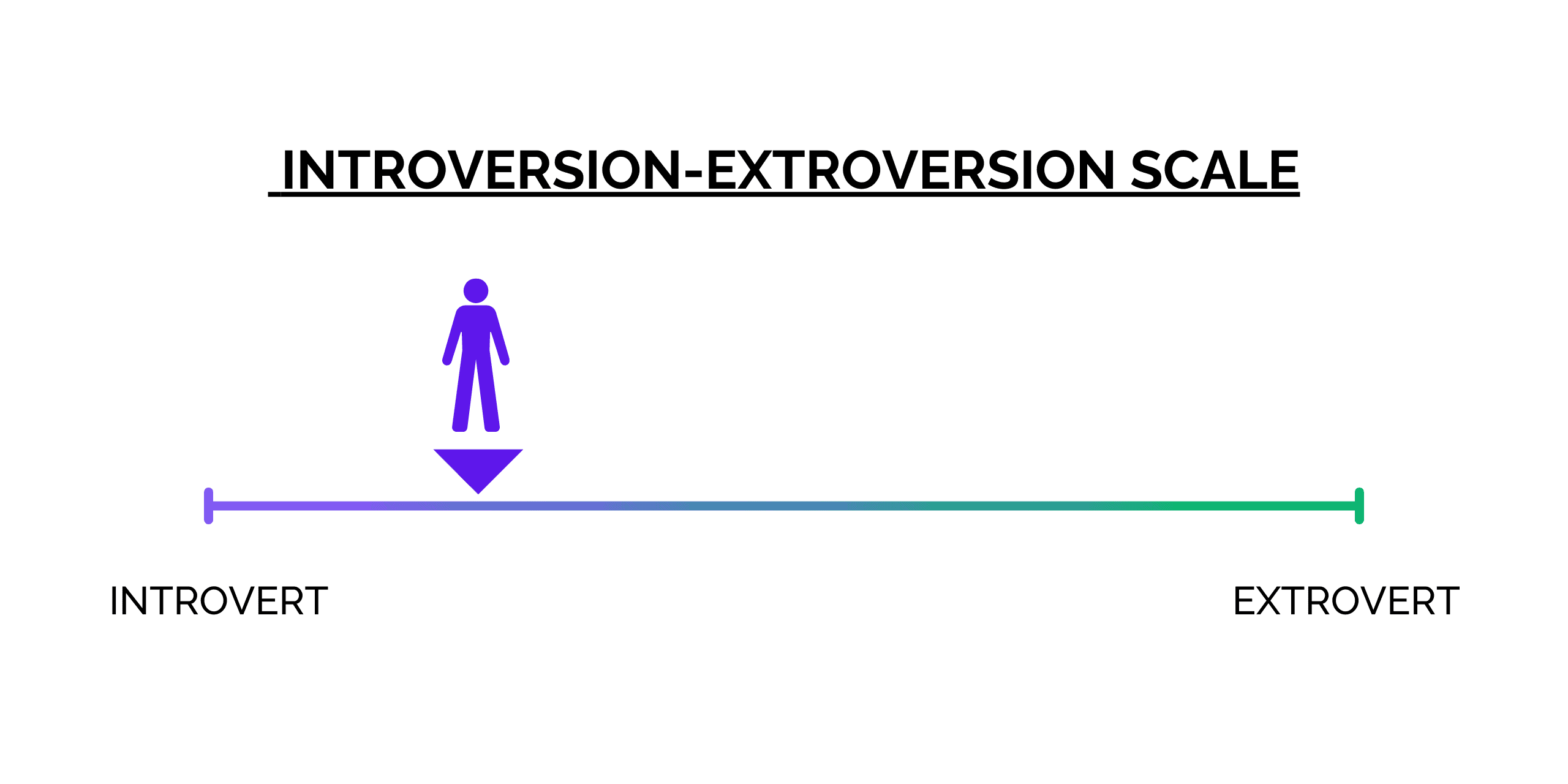
At a recent group dinner, I mentioned that my partner and I are both introverts, which was met with some confused looks.
I had to explain that we are Learned Extroverts — we are introverts who have learned to act like extroverts.
Most people find it hard to believe that introverts can learn the social skills, expressions, and behaviours that extroverts naturally possess.
At a high level, you can think of extroversion as the ability to have fun conversations and enjoy being around people.
And if you want to be nerdy about it, it is the ability to:
- Respond to conversation with a wide range of emotional responses.
- Chain conversations together into a conversational flow.
- Understand and make small talk about a wide range of culturally relevant topics.
- Pull people into conversation, let people speak and lead, and merge social groups and topics together.
- Move conversations forward when needed, and allow them to end when not.
- Keep the energy levels of yourself and others high and engaged.
- Read people.
Natural extroverts learn all these skills simply in the course of growing up because they are driven to be around people all the time. Introverts do not have the same experience.
To illustrate, an extrovert goes out every week, meeting say five people every time they go out. This happens from when they’re a teenager through to however old they are now.
An introvert can go entire months without seeing anyone except their significant other and family.
So over the course of say a year, an extrovert meets about 250 people, many of them new. An introvert meets maybe 50 people, and that’s being generous. This means that every year, the extrovert accumulates five times more experience in interacting with other people, which, of course, makes them much more polished at it.
But can an introvert learn the same social skills that an extrovert has?
Absolutely. Here’s how.
What Is Extroversion?

It is useful to begin by defining what exactly extroversion (extraversion) is.
There are two different views on this.
The scientific view is that extroversion and introversion can be defined by the amount of stimuli required to elicit a physiological response in a person. This is popularly known as the “lemon saliva test”.1Eysenck, S. B. G., & Eysenck, H. J. (1967). Salivary Response to Lemon Juice as a Measure of Introversion. Perceptual and Motor Skills, 24(3suppl), 1047-1053. https://doi.org/10.2466/pms.1967.24.3c.1047
Simply put, extroverts require more lemon juice to produce the same amount of saliva compared to introverts.
The more popular definition of introversion/extroversion is whether being around other people energises or drains you.
In this case, extroverts feel energised by being around others, while introverts typically feel drained, and have to recharge in solitude.
This definition leads to the stereotype that extroverts are outgoing, social, and fun to be around, and introverts are quiet, brooding loners.
In reality, introversion/extroversion is more of a gradient scale, and everyone falls somewhere on the scale:
Learned extroversion, however, does not mean that you will enjoy being around others the same way that naturally extroverts do.
It does not mean that you will need more stimuli to elicit a saliva response.
It does not mean you will recharge your energy by being around others — you will still need to find your own alone time to recharge.
It simply means that to others, you will appear to socialise and interact with others like an extrovert.
Breaking Down What We Perceive as Extroversion
Let’s take this one level further and break down what “socialise and interact with others like an extrovert” actually means.
I believe it is two things:
- Flow of conversation.
- Higher energy levels in conversation and around people.
The flow of conversation simply means that you are great at making small talk — on various topics, with seamless transitions between topics, and with the correct pop culture references. This also includes the absence of conversation killers and the ability to carry the conversation when other people are silent or don’t know what to say.
Higher energy levels means being “outgoing” or “fun to be around”. It means expressing in a way that is perceived as louder, more assertive, more confident and more expressive. It means appearing comfortable in group settings and social situations.
One interesting note is that natural extroverts always need to be around other people — they will proactively seek excitement and activity. As a learned extrovert, you will have no desire to do this.
Learned Extroversion Skills
Learned extroversion skills are really a subset of the Basic Social Skills Stack.
Here are the ones that are relevant.
Verbal
- Small talk.
- Relating.
- Speaking with friends. Not so much speaking with strangers, as most introverts will remain introverted around strangers.
- Social appropriateness.
- Sarcasm.
- Playfulness.
- Not sympathy/empathy as, strangely enough, people do not look for these when assessing how outgoing someone is.
Non-Verbal
- Eye contact.
- Body language.
- Voice.
- First impressions / physical appearance.
- Not really physical touch, as most communication with friends and acquaintances will be verbal.
Sensory
- Social calibration.
- Sensory intake.
- Active listening.
- Spatial perception.
Contextual
- Social etiquette and situational awareness.
- Persuasion.
- Leading.
How to Learn Extroversion Skills

Some people may argue that introverts learning extroversion skills is “faking” it because it’s all an act.
I do not believe this to be the case for a couple of reasons.
First, extroverts have learnt these skills as part of growing up. You would simply be learning them in a direct and focused way as an adult.
Second, introversion-extroversion is a gradient scale, so you are really just shifting yourself along that scale towards extroversion in terms of social skills.
Before we dive into the specifics of each learned extroversion skills, you may be wondering exactly HOW these skills are learnt.
They are learnt through a combination of theory and practice.
Theory means that you conceptually learn about specific skills, through:
- Reading books.
- Taking online courses.
- Attending classes like improv or standup comedy.
As an introvert, theory is likely your strength, so lean into it with self-study and intellectually processing what must be done before going out to apply it.
After you understand enough theory, you need to go practice, practice, and practice more.
You need to have lots and lots of conversations — with friends, at your social hobbies, at meetups, and just being social by saying “yes” to as many social invitations as you can.
The act of practicing will let you subconsciously correct many things without having to intellectually direct every correction.
Remember: You have to catch up with the five times greater experience that natural extroverts have accumulated.
You may not have to have as many interactions as they have had to become a learned extrovert, but you still have to have enough interactions to cross the “learned extrovert” threshold.
Let’s break down each of the extroversion skills and look at the best way to learn each of them.
Verbal Extroversion Skills

Small talk
Small talk can be broken down into a number of sub-skills:
- Listening to others.
- Pop culture references.
- Topic silos.
- Conversational flow.
Listening to others is best learnt by putting yourself in numerous small talk situations, and learning by seeing what is appropriate to say or not.
Pop culture references refers to celebrity gossip, references to TV shows and movies, quotes, memes and so on.
Despite the bad reputation that pop culture has amongst the educated, people like to talk about it.
You don’t need to be an expert in all things pop culture, but you need to contextually understand the references and be able to insert some into conversation.
These references will be “niche dependent”, to borrow a term from marketing. They will largely depend on the people you socialise with.
For example, if you live in a non-Anglosphere country, they will have their own pop culture related to their own celebrities and media. If you socialise in specific communities like digital nomads, expat business people or say fitness enthusiasts, they all have their niche-specific pop culture references that everyone follows and is expected to know.
Two easy ways to stay on top of these:
- Subscribe to r/popculturechat or r/fauxmoi on Reddit for Hollywood/Anglosphere references.
- Curate your X/TikTok/Instagram feeds to deliver you updates.
Topic silos refers to the fact that everyone is an expert in something. What you need to do is be able to talk about that topic in an interesting way.
That doesn’t mean that when you speak with someone that the entire conversation is entirely about that topic, but that being an expert in a particular topic allows you to demonstrate your knowledge, expertise, and passion for the topic, the conveyance of which makes it compelling to other people.
This also means recognising that other people have topics that they are experts in, and that you should allow them to speak about them and even indulge in them.
Some social magic happens when you are an expert in topics that other people are interested in — you will find that your ability to connect with people and form relationships skyrockets.
Bonus tip: You can become an expert in some of these universally-interesting topics with some reading.
The last part of small talk is conversational flow.
This means that when someone says something in conversation, you can:
- Relate and move forward with the topic, using a “Yes, and” statement, flatly agreeing, or asking an open-ended question.
- Reply with something playful or nonsensical like a joke, sarcasm, or a tease if in a dating context.
- Respond with a physical touch, especially in a dating context.
- Pivot the topic to something else.
Doing this will require conscious attention in the beginning, but will become subconscious over time.
Relating
Relating is part of conversational flow, and basically the art of using statements, questions and the “yes, and” structure from improv comedy to make others feel heard and also progress the conversation forward.
The best way to learn this apart from having lots and lots of conversations is to take improv comedy classes.
Talking with friends
Talking with friends is one of the skills in the learned extroversion skill stack, but the only way to improve at this is really to “say yes” to lots of social invitations from friends and to go interact with them.
Social appropriateness
Social appropriateness is highly contextual and dependent on the culture of where you are.
You can learn some of this by reading books, blogs, and articles about the culture of where you are, but in-depth understanding only comes from living in a location for an extended period of time, and putting yourself in social situations.
Sarcasm and playfulness
Playfulness is a comedic skill learned from doing standup comedy or improv comedy. It breaks down into subskills like improvisation and callback humour.
Sarcasm is a related skill, and I believe one that can only really learnt in the Anglosphere.
It is picked up through conversation with others, and from watching standup comedy sets, especially in English.
For whatever reason, other countries and cultures just don’t have the same highly developed sense of sarcasm.2I have heard that German culture also excels at sarcasm, but I don’t speak German and don’t have any firsthand experience with it.
Non-Verbal Extroversion Skills

Eye contact
Eye contact simply means being able to look at people in their eyes during conversation.
This is best learnt in Western/Anglosphere countries where eye contact is considered a mark of trust or confidence, and more people are likely to practice it. This contrasts with say, some Asian cultures, where eye contact skills are fairly poor as they are not culturally emphasised.3Though thanks to globalisation, confident eye contact is still impactful in those cultures.
Two suggestions for learning eye contact:
- It is less strange to look at the middle point between someone’s eyes than directly into each eye.
- There are YouTube videos available for practicing eye contact.
Body language
Body language is extremely difficult to learn on your own.
Sure, you can read books about body language, but they only go so far.
A common example of why would be:
Crossing your arms is supposed to indicate strength and potentially confrontation. Or it could just mean that you’re cold.
The best way to learn body language is to practice with a coach who can give you feedback on how to stand, sit, where to emphasise your body weight and positioning and so on.
You can also try to model the body language of people in films, TV shows and the media who are perceived the way you want to be perceived.
Voice
The easiest way to strengthen your vocal skills is to work with a vocal coach.
If you would like to play into the stereotypes:
- Men should have a deep, booming voice, meaning that most men should drop their voices an octave or two and speak slower.
- Women should either have a clear, bell-like voice, or a deep, husky voice.4Keeping in mind I’m not a woman so this is just my less-informed perspective.
First impressions and physical appearance
First impressions and physical appearance refers to the standard “be in shape by eating healthily and exercising” advice.
It also means engaging a fashion consultant who can help you identify what outfits fit you well, and are also suitable for building your own style.
This is not the same as following fashion trends which change over time, but developing a basic style that communicates what you want it to, and that you can call your own.
Tidying up your physical appearance is usually an easy fix — it can be as simple as identifying what an extroverted version of you would dress like, as appropriate for your age and identity, compared to what the introverted version of you dresses like now.
Sensory Extroversion Skills

Sensory Extroversion Skills refers to the ability to read the people and environment around you.
As a natural introvert, you are already great at this because it is simply observation and assessment.
Social calibration
Social calibration is learning what cues from other people mean.
As an introvert, you probably already pick up on all these cues, but you may not have the correct interpretation of them.
For example, if someone turns away from you, is that:
- Them being bored?
- Being rude and breaking rapport?
- Just needing to reach for something behind them?
You can learn cues from theory (books/courses on body language), and then go out into the real world, and observe and test your observations.
Social calibration also includes knowing what is appropriate to do or say depending on the level of familiarity or rapport you have with someone.
The benchmark for understanding social calibration is when you start to notice other people doing or saying the “wrong thing” in social situations.
Sensory intake
Sensory intake is simply opening yourself up to the real world around you.
It means getting out of your phone. It means when you are outside, don’t put in your headphones, and don’t scroll through social media.
Instead, observe the people and environment around you.
This is a super simple exercise of people watching, seeing what people are doing, who is watching them, and what observations you can make about them.
Doing this will also help improve your spatial perception.
Active listening
Active listening is a whole topic in and of itself. Guide coming soon.
Contextual Extroversion Skills

Social etiquette and situational awareness
Social etiquette and situational awareness simply means “not being weird”.
It means not overreaching in social situations.
Overreaching is where people:
- Say something inappropriate.
- Ask questions that are a bit too personal.
- Ask too many questions over text, or too detailed questions over text.
- Assume familiarity and rapport where it doesn’t exist yet.
You develop situational awareness when you develop good social calibration, and with it, you understand when to stay in rapport, and when to intentionally break rapport.
Persuasion
The best way to learn persuasion is to read marketing, sales, consumer behaviour and psychology books.
I highly recommend starting with Robert Cialdini’s Influence.
The rest is just practice.
Leading
Leadership is the ability to envision something and then supply action until it is done.
This action can include recruiting other people to your cause.
There are many types of leaders, so do not feel pressured to conform to any particular archetype. Some people lead quietly from the back, and some are the face of the vision, charging from the front.
The main thing here is that others perceive you to be a leader.
You do not need to hold an actual leadership role in your work or community for this. If you are doing well in life, and can convey this through all the other skills outlined in this guide, this becomes automatic.
What To Do Next
If you’re an introvert looking to become a learned extrovert, use this guide as your starting point. The skills in this short guide take time to learn and practice — potentially up to a few years.
But once you’ve learnt them, you’ll know how to be “outgoing” and “social” on-demand.
If you haven’t read the Basic Social Skills Stack yet, I suggest reading that next.
- Eysenck, S. B. G., & Eysenck, H. J. (1967). Salivary Response to Lemon Juice as a Measure of Introversion. Perceptual and Motor Skills, 24(3suppl), 1047-1053. https://doi.org/10.2466/pms.1967.24.3c.1047
- I have heard that German culture also excels at sarcasm, but I don’t speak German and don’t have any firsthand experience with it.
- Though thanks to globalisation, confident eye contact is still impactful in those cultures.
- Keeping in mind I’m not a woman so this is just my less-informed perspective.

